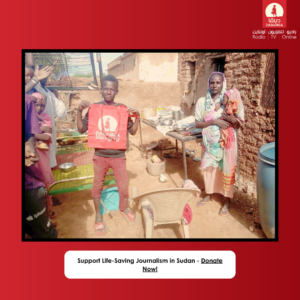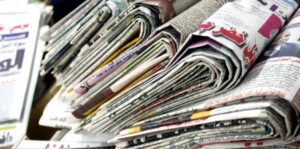Crackdown on press: Al Jazeera arrests, newspapers banned
Sudan’s security service has banned three newspapers from publication and arrested an editor-in-chief and several journalists. International journalists are targeted, too: security officers stormed an Al Jazeera office, arrested correspondents and confiscated their cameras.
 (file photo)
(file photo)
Sudan's security service has banned three newspapers from publication and arrested an editor-in-chief and several journalists. International journalists are targeted, too: security officers stormed an Al Jazeera office, arrested correspondents and confiscated their cameras.
The National Intelligence and Security Service (NISS) has the authority to detain and ban journalists or censor newspapers which circulate information that the government does not want to be public.
In its newest move to censor information about the ongoing demonstrations in Sudan, the NISS the publication of El Baath, El Mijhar and El Jareeda newspapers without providing the reasons.
El Jareeda and El Watan newspapers were also barred from distribution on Saturday.
El Sayha editor
On Sunday, the security service arrested the editor-in-chief of El Sayha newspaper, Abu Obeida Abdallah, from the newspaper's office in Khartoum. He has been taken to an unknown destination and family and colleagues have not received word from him until Monday evening.
Journalists Aisha El Samani, Sarah Deifallah, Majda Mohamed Ali and Mohamed Ibrahim were also detained that day.
Al Jazeera correspondents assaulted
On Saturday, NISS officers stormed the office of the Qatari and international news channel Al Jazeera in Khartoum and arrested correspondents Tahir El Mardi, Ismail Adam, Majdi Sadig, Ahmed Yassin and Ahmad El Baseily.
The director of the local office of Al Jazeera, El Musalami Kabbashi said that the officers took a number of cameras and phones from the staff. The five correspondents were taken to an unknown destination on Saturday night before being released on Sunday morning.
“They were severely beaten and insulted in humiliating and obscene terms,” according to Kabbashi. When he went to the NISS office to ask why they were arrested, the authorities did not give him an explanation.
“My arrested colleagues said they were described as 'traitors' and 'agents' and accused of working against the interests of the homeland.”
Press permits withdrawn
The security apparatus has withdrawn the work permits of Osama Sayed and Ahmed El Riheid, both correspondents for Al Jazeera, and of photographer Badawi Bashir. A correspondent of El Arabiya Saadedin Ibrahim was also notified about the withdrawal of her permit.
Dr Maryam El Sadig, Co-President of the National Umma Party, explained to Radio Dabanga yesterday that a journalist from a Turkish news channel contacted her on Monday. The journalist apologised for not hosting her in their news bulletin because the Sudanese security authorities officially prevented Ramattan News Agency from receiving her in the studio and in any other satellite news broadcasts and programmes.
In January, Sudanese authorities withdrew work permits and press cards from journalists of Sudanese and foreign media agencies, including at the offices of Al Jazeera and El Arabiya TV Satellite channels in Khartoum, as well as correspondents of the Turkish Anadolu news agency.
International press watchdog Reporters Sans Frontières (RSF) and the Sudanese Journalists’ Network said in March that 79 journalists have been arrested since December.
Journalists barred from parliament
On Monday, the national parliament was a no-go area for journalists as media were banned from covering the hearing of the reports from the defence and interior ministers about the security situation in the country.
The report of Defence Minister Lt Gen Awad Ahmed Ibn Auf would be read before the MPs in a secret session, the national parliament announced in a general statement to the press.
The Sudanese state's news agency SUNA reported afterwards that general Awad Ibn Auf addressed the session saying that security forces would not permit attempts to divide them from the Sudanese army. He did not criticise the protesters and expressed some sympathy with their grievances.
“Sudan’s armed forces understand the reasons for the demonstrations and is not against the demands and aspirations of the citizens, but it will not allow the country to fall into chaos,” he said.
In the early hours of Monday morning, violent confrontations broke out between the Sudanese army and security forces. This resulted in the death of soldier Sami Sheikheldin. The general command of the SAF has made no clear statement about their position in the civil protests but in the streets, soldiers can be seen supporting the demonstrators.











 and then
and then